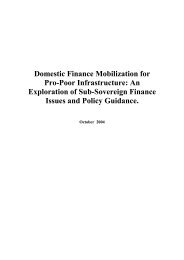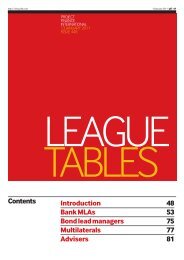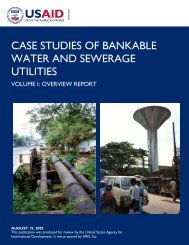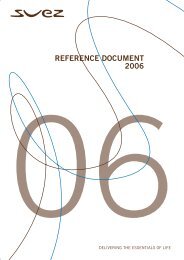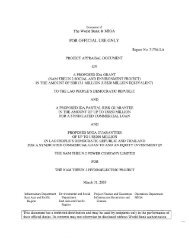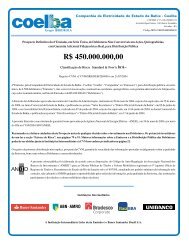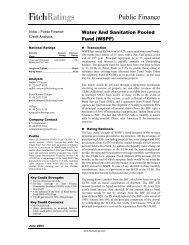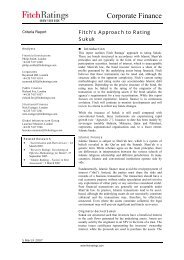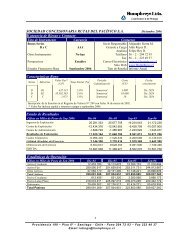S&P - Public Finance Criteria (2007). - The Global Clearinghouse
S&P - Public Finance Criteria (2007). - The Global Clearinghouse
S&P - Public Finance Criteria (2007). - The Global Clearinghouse
Create successful ePaper yourself
Turn your PDF publications into a flip-book with our unique Google optimized e-Paper software.
Appropriation-Backed Obligationsciency in the state sinking fund because of a schooldistrict or governmental unit’s failure to meet itsdebt service obligations. <strong>The</strong> rating for WestVirginia’s program reflects the state’s strong debtservice oversight and the legislature’s replenishmentprovision for the bond commission’s sinking fund.Wyoming School District BondGuarantee Program (‘AAA’)Governing statutes: Local school district bonds areeligible to be guaranteed by the Wyoming SchoolDistrict Bond Guarantee Program under Chapter 13of the state’s Farm Loan Board rules and regulationsand Wyoming state statutes 9-4-701(j). This ratingwill move in conjunction with that of the state.Eligibility requirements: School districts applyingfor qualification under the program must first providethe Office of State Lands and Investments aletter from a nationally recognized rating agencyindicating that the bonds would be of at leastinvestment-grade quality. Applications for bondissues over $5 million must be accompanied by theprecise underlying rating before the guarantee canbe granted.Program provisions: No more than $300 millionin school bonds may be guaranteed by the pledgedguarantee fund, a very strong 3:1 leverage ratio.Bonds guaranteed under this program are backed by$100 million from the state’s Common SchoolAccount. <strong>The</strong> $100 million guarantee fund is a fungiblesubset of the Common School Account. <strong>The</strong>Common School Account is a state trust fundderived from mineral royalties on lands dedicatedfor school income and is, in turn, a non-fungiblesubset of the state Permanent Land Fund. Whileonly $100 million is pledged from the CommonSchool Account, and amounts over $100 million inthe Common School Account could be dedicated inthe future to other school programs, current implementationrules charge investment losses firstagainst the non-obligated part of the CommonSchool Account. This provides an even greater guaranteecushion, as the pledged fund would garner thelast non-obligated $100 million in the fund in theevent of investment losses.<strong>The</strong> Common School Account can be used onlyfor school purposes and currently contributesinvestment income for yearly distributions toschools. <strong>The</strong> state treasurer’s investment policy setsguidelines intended to maximize yield within theconstraints of maintaining book value. Outsidemoney managers can be hired to manage a portionof investments. Outside managers’ transactions arereported monthly and performance is judged quarterly.Each outside manager is expected to maintainan average portfolio credit quality of at least ‘AA’.Up to 5% of a portfolio may be invested in unratedsecurities, provided that these securities are judgedby the Board to be at least of investment-gradequality. No more than 5% of the portfolio may beinvested in obligations of any single issuer otherthan the U.S. government. Investment allocationsmay change over time, but have historically beenconservative. In addition, the guarantee programrules require that an amount at least equal to 10%of guaranteed bond principal be invested in U.S.government securities of three years’ maturity orless to ensure liquidity. Debt service payments arenot accelerated in the case of an underlying schooldistrict’s default, preserving the liquidity of theguarantee fund.Program rules provide adequate time for guaranteefunds to cover debt service payments when due, ifneeded. An independent paying agent is required tonotify the State Treasurer not less than five daysbefore a debt service payment date if it becomesaware of a potential default on a guaranteed debtobligation. Program rules also require a school districtto notify the state treasurer on its own 15 daysbefore a due date, if it projects that it will not be ableto pay debt service. If there is a debt service shortfall,the treasurer must pay the paying agent an amount tocover the shortfall at least one day before the debtservice due date. <strong>The</strong> state requires a defaultingschool district to repay the Common School Accountfor any draw, including lost interest on the fund. ■Appropriation-Backed ObligationsAppropriation-backed obligations come in variousforms; the most prevalent are lease revenuebonds, certificates of participation, and service contractbonds. Municipal appropriation-backed obligationsfrequently are used to avoid constitutionalor other legal restrictions on the use of GO debt.Appropriation-backed obligations may also be themost expedient and flexible financing method formany governments. For these obligations, timelypayment of principal and interest depends on annualwww.standardandpoors.com103



